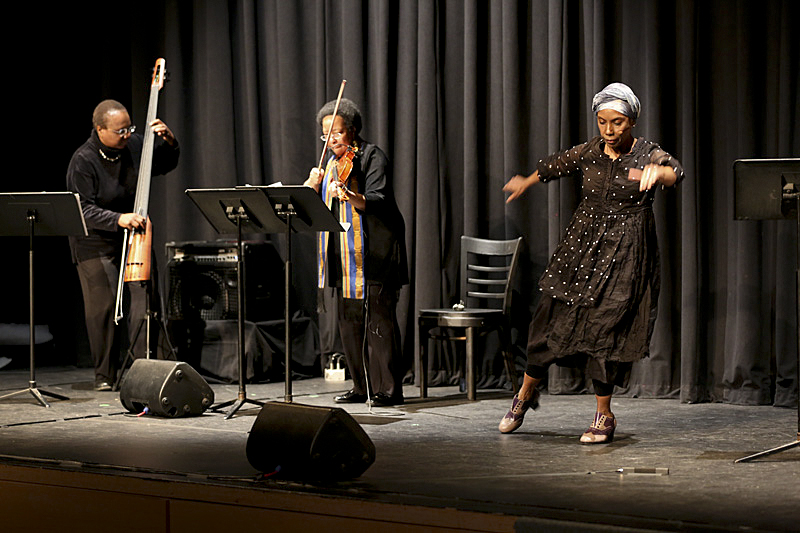Ingram dances between the law and arts in 'DEIS Impact keynote
The social justice festival continues with events through Feb. 7
 Photo/Mike Lovett
Photo/Mike LovettGermaine Ingram with bassist Jacqueline Pickett and violinist Diane Monroe.
It was an appropriate combination for Ingram, who is both an acclaimed jazz tap dancer and an accomplished civil rights lawyer. Before turning to her performance career full-time, Ingram practiced law for 30 years, litigating employment discrimination class action suits, and challenging policies and practices that limited employment opportunities for women and minorities.
Ingram’s work as a tap dancer, choreographer and vocal performer has often focused on themes of history and social justice. The day before her keynote, she performed "Freedom Underfoot," a look at the final horrific year of the Civil War in Atlanta through song, dance and the spoken word.
Addressing the audience in the Carl J. Shapiro Theater in the Shapiro Campus Center Wednesday, Ingram described her skepticism of the ability to achieve transformation through the law, pointing to the lack of progress in education equality in spite of landmark court decisions and laws that were passed more than 50 years ago.
"If the Supreme Court decisions of the 1950s and 1960s transformed the legal landscape for people of color seeking education equality, why in 2015 did a Supreme Court justice ask during oral arguments in an affirmative action case whether it might be better for black students to go to a slower track school where they would do well?" Ingram said. "Why, more than 50 years after the Civil Rights Act of 1964, are schools more racially segregated than they were in 1968? Why do I feel that legal induced transformation reforms rarely go as far as they need to and rarely last as long as they should?"
As for the arts, Ingram said the artistic experience should create a shared ownership between audience and performer.
"Rather than inviting audiences to sit back and relax, we urge them to lean forward to shape the space by their imagination, patience, curiosity and awareness," Ingram said. "As artists and audiences we return again and again for renewal, for reconnection with a sense of community, for reciprocity, and for new possibilities of understanding."
Now in its fifth year, ’DEIS Impact, Brandeis’ annual festival for social justice, is a collaboration of the Brandeis Undergraduate Student Union and the International Center for Ethics, Justice and Public Life, with support provided by the Louis D. Brandeis Legacy Fund for Social Justice. Ingram's visit was part of the Student Support Services Program 25th Anniversary Celebration, and co-sponsored by Brandeis Posse and the Minor in Creativity, the Arts, and Social Transformation. This year’s 'DEIS Impact festival features nearly 50 events conceived and brought to fruition by students, staff and faculty. Events continue through Sunday, Feb. 7. A full schedule can be found on the festival's website.
Categories: Alumni, Arts, Humanities and Social Sciences, Student Life





